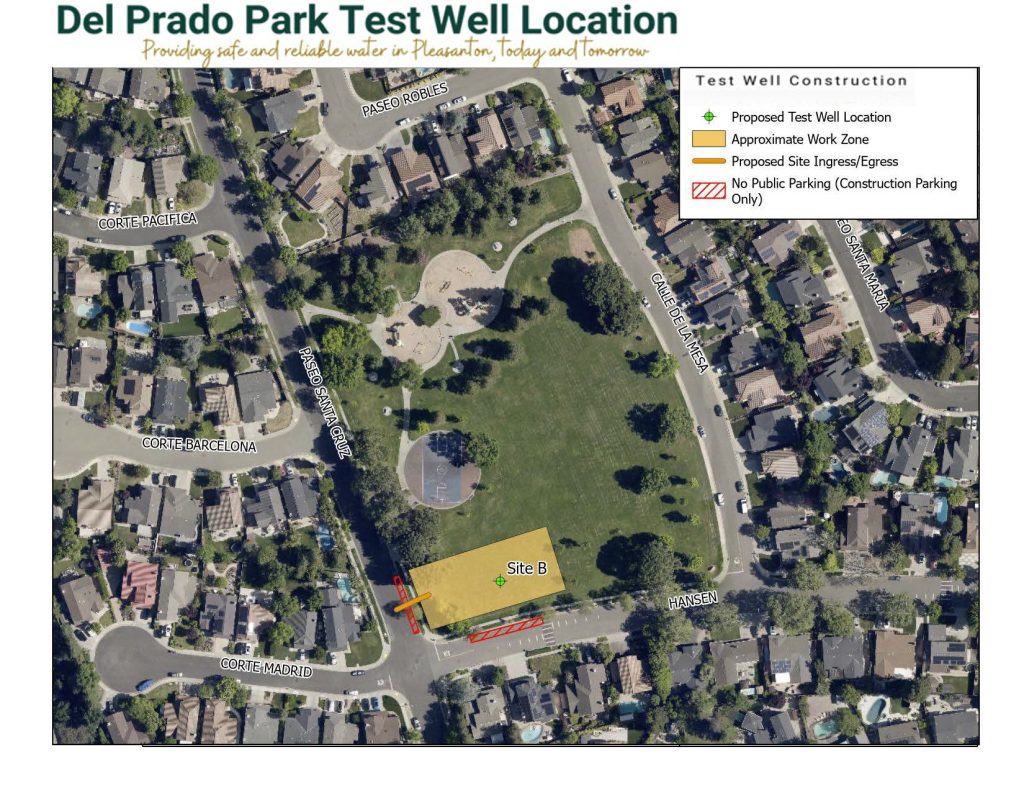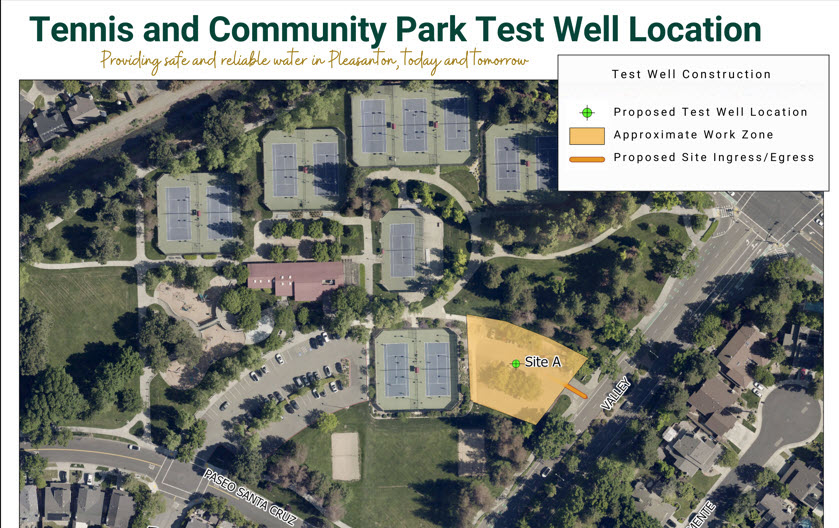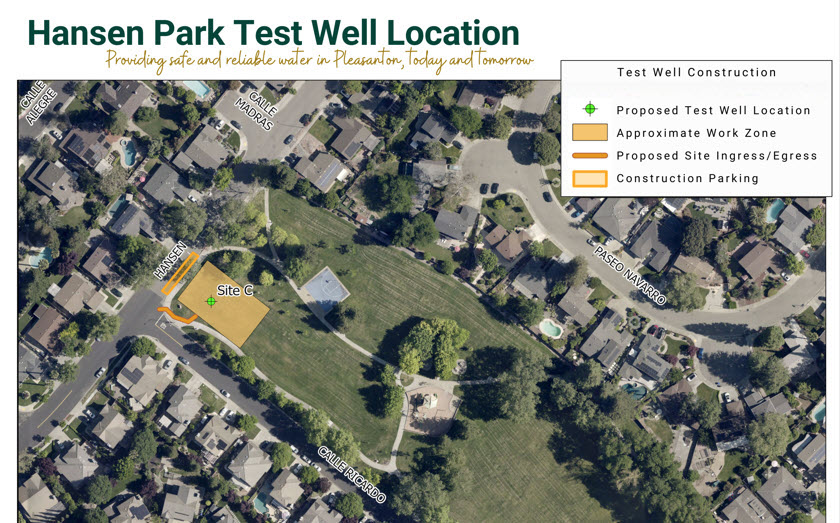Joint Groundwater Wells Project
Background
The City of Pleasanton (City) has local groundwater wells that supply up to 3,500 acre-feet per year of water (known as City’s groundwater production quota or GPQ), which represents approximately 20 to 25 percent of the City’s total water supply needs. The remaining water supply for the City is purchased from Zone 7 Water Agency (Zone 7). Zone 7 is a water wholesaler who procures and treats water from the California Department of Water Resources (DWR) and produces water from its joint groundwater wells to sell to Tri-Valley water retailers for distribution to its customers.
Per- and polyfluoroalkyl substances (PFAS) have recently been detected above regulatory requirements in portions of the Livermore-Amador Valley Groundwater Basin. This detection has impacted some of Zone 7’s joint groundwater wells (see Zone 7 PFAS Information for details) and made all of the City’s groundwater wells non-operational (see Pleasanton Water for details). On October 17, 2023, the City Council approved proceeding with the planning of new groundwater wells within the Bernal subbasin (which is believed to be outside the existing PFAS plume based on Zone 7 testing and groundwater modeling) to recover the use of its GPQ. On June 18, 2024, the City Council approved an agreement with Zone 7 to evaluate the feasibility of jointly constructing and operating these new groundwater wells.
Overview
The Project is envisioned to include the following elements:
- Construction of new groundwater well(s) in the Bernal subbasin with the goal to increase Zone 7’s groundwater production capacity and drought resiliency for the overall Tri-Valley region, recover the City’s GPQ, and produce water supply that meets and exceeds all State and federal water quality standards.
- Connection of the new groundwater well(s) to Zone 7’s water supply system and upgrade of the existing Zone 7 Hopyard Treatment Facility to treat the water.
- Delivery of the City’s GPQ via the Zone 7 water supply system (as opposed to the current configuration of direct delivery from dedicated City wells).
Zone 7 will serve as the lead agency in the evaluation, permitting, design, construction, operation, and maintenance of the project. The City will support Zone 7 by providing necessary land rights and paying its fair share of costs.
The Project will be implemented in the following phases:
- Phase I – Feasibility: This phase will evaluate the feasibility of the Project and has a target completion date of summer 2025.
- Phase II – Design and Construction: If the City and Zone 7 find the Project to be feasible, this phase will include the design and construction of improvements in accordance with Phase I recommendations. The target completion date for this phase is early 2029.
- Phase III – Operation and Maintenance: This phase would start after completion of Phase II and when required permits to operate are in place.
Phase I-Feasibility Activities
The Project is currently in Phase I-Feasibility. Activities include the following:
- Well Siting Evaluation: A well siting analysis completed in June 2024 determined the top locations for potential groundwater facilities to be Del Prado Park, Pleasanton Tennis and Community Park, and Hansen Park. The benefits of these locations are they are City-owned which simplifies implementation, close to Zone 7’s Hopyard Treatment Facility for cost efficiency, they have ample space for construction and operation and are outside the assumed PFAS footprint (pending study confirmation).
- Feasibility Study: A study will be performed to determine the feasibility of the Project based on factors such as water yield and quality, sustainability of the groundwater basin, and project costs and implementation requirements. On October 16, 2024, the Zone 7 Board authorized its General Manager to enter into an agreement with Luhdorff & Scalmanini Consulting Engineers to perform the study. Additional information on the study findings and recommendations will be provided as they are available.
- Test Well Construction at Del Prado Park: A test well was successfully constructed at Del Prado Park in January 2025 and was used to collect information on water yield and quality for analysis during the feasibility study.

- Test Well Construction at Tennis and Community Park: Test well construction was successfully completed at Tennis and Community Park in March 2025 and was used to collect information on water yield and quality for analysis during the feasibility study.

- Test Well Construction at Hansen Park: Test well construction was successfully completed at Hansen Park in mid-May 2025. The test well is now being utilized to collect information on water yield and quality for analysis during the feasibility study. Data collection will extend to the end of May 2025 and include the use of water pumps and supporting equipment such as generators. Restoration of the work area is anticipated to occur in June 2025.

Water Project FAQs
What is the Joint Groundwater Wells Project?
Why is this project needed?
All of the City’s existing groundwater wells are out of operation due to per- and polyfluoroalkyl substances (PFAS) contamination. New wells are needed to replace the lost water supply and ensure a reliable source of drinking water for Pleasanton residents.
What are groundwater wells and how do they work?
Groundwater wells are vertical shafts drilled into the ground to access underground water sources, known as aquifers. Wells are typically created by drilling a hole into the ground and installing a pipe (casing) with screens to allow water in while keeping soil and debris out. Most modern wells use electric pumps to bring water to the surface.
With the Joint Groundwater Wells Project new wells are being developed to replace existing wells affected by PFAS concentrations, ensuring a continued supply of safe drinking water for Pleasanton residents.
What are PFAS
PFAS (Per- and Polyfluoroalkyl Substances) are a large group of synthetic chemicals designed to resist heat, water and oil. PFAS are used in a wide range of industrial and consumer products such as fire-fighting foams, stain- and water-resistant clothing, carpets, cleaning products, non-stick cookware and food packaging.
PFAS have been found in air, soil and water around the world, and are persistent in the environment. They can accumulate in the human body over time, and are toxic at relatively low concentrations. Scientific studies have shown that exposure to some PFAS in the environment may be linked to harmful health effects in humans and animals. Although certain PFAS are no longer manufactured in the U.S., these chemicals are still produced internationally and imported into the U.S. in consumer goods.
For additional information about PFAS, see the Pleasanton Water webpage.
What is the timeline for this project?
The project is separated into three phases:
- Phase I – Feasibility: Evaluation of the feasibility of the joint project with a target completion date of summer 2025.
- Phase II – Design and Construction: If the City and Zone 7 find the Project to be feasible, Phase II will include the design and construction in accordance with Phase I recommendations. The target completion date for this phase is early 2029.
- Phase III – Operation and Maintenance: This phase would start after completion of Phase II and when required permits to operate are in place.
Where are the potential well sites being evaluated?
- Pleasanton Tennis and Community Park (5801 Valley Ave.)
- Del Prado Park (5196 Golden Rd.)
- Hansen Park (5697 Black Ave.)
How were these sites selected?
The three sites were selected for the following reasons:
- City-owned, allowing for easier implementation
- Close proximity to Zone 7’s Hopyard Treatment Facility for cost efficiency
- Sufficient space for construction and operation
- Located outside of the assumed limits of PFAS groundwater concentrations
What will happen at these test sites?
Drill rigs and supporting equipment will be set up to construct test wells and perform water yield and quality testing. See figures above for proposed test well locations in each park, anticipated access impacts, and approximate windows of construction.
How will construction impacts like noise be managed?
All construction activities must follow City of Pleasanton noise regulations. Measures like sound walls will be used as needed during temporary test well construction. Permanent production well facilities will be designed with measures such as submersible pumps and equipment fully enclosed to minimize operational noise.
How can I stay informed or provide input?
The City of Pleasanton is committed to keeping the community updated throughout the project.
This project-specific webpage will contain the project background, the latest updates, and information about relevant community outreach events. Residents can also sign up for email updates, participate in upcoming community meetings, and monitor the City’s social media pages to stay informed on the project.
To provide input contact the Public Works Department via our contact form or (925) 931-5500.
Additional Information
Project related information is provided below:
- On June 18, 2024, the City Council approved an agreement to partner with the Zone 7 Water Agency on Phase I (Feasibility) of constructing new wells as part of a Joint Groundwater Wells Project.
- On May 7, 2024, the City Council approved the execution of a $19 million water revenue bond to assist in financing improvements to the City’s water system, including Phase I of the Joint Groundwater Wells Project.
- View the October 17, 2023 City Council Water Supply Alternative Agenda Report
Should you have any questions or comments regarding the Project, please contact the Public Works Department at (925) 931-5500.
